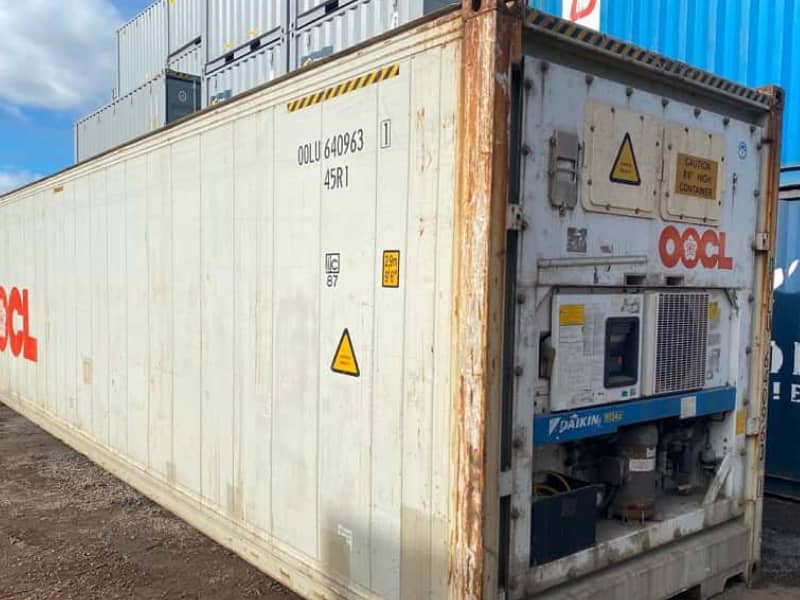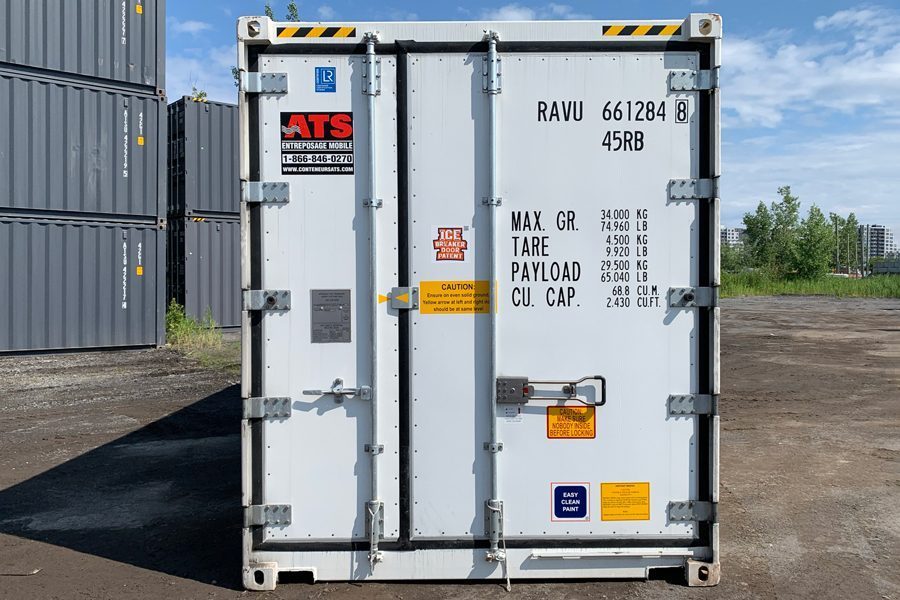Everything About Cold Store Containers: Important Insights for Your Storage Space Requirements
Cold storage containers play an important role in the preservation of subject to spoiling goods. They can be found in various forms, consisting of refrigerated and protected units, each created for certain storage space requirements. Comprehending the benefits and vital functions of these containers is vital for businesses intending to optimize their procedures. As the need for reliable storage space solutions expands, checking out the different choices readily available can bring about informed choices that affect both profitability and sustainability. What aspects should one take into consideration when choosing the appropriate container?
Kinds Of Freezer Containers
Freezer containers come in different kinds, each made to satisfy details temperature control requirements. Amongst one of the most common types are cooled containers, which maintain temperatures in between 0 ° C to 10 ° C, making them appropriate for perishable products like fruits, vegetables, and milk products. One more kind is the deep fridge freezer container, which runs at temperatures listed below -18 ° C, suitable for long-lasting storage of icy products such as meats and fish and shellfish.
Shielded containers supply temperature level security without active air conditioning, making them beneficial for temporary transportation of temperature-sensitive items. Additionally, there are portable freezer devices, which provide versatility in locations and are often utilized in occasions or seasonal procedures. Ultimately, blast refrigerators rapidly reduce the temperature level of hot foods, guaranteeing safety and quality. Each type serves a distinct purpose in numerous industries, from food service to drugs, highlighting the importance of selecting the appropriate container for details storage demands.

Benefits of Making Use Of Freezer Solutions

Additionally, freezer services expand the life span of products, lowering waste and enhancing success for companies. By effectively handling inventory with correct temperature control, business can maximize their supply chains and enhance operational effectiveness.
Furthermore, cold store facilities permit flexible storage options, accommodating various quantity demands and seasonal fluctuations popular (used 40ft refrigerated shipping containers). This versatility assists companies respond promptly to market adjustments
Utilizing chilly storage space remedies can guarantee conformity with health and security laws, safeguarding both organizations and consumers. In general, the critical use freezer boosts item management while promoting sustainability and financial practicality.
Key Features to Look for in Freezer Containers
When picking cool storage containers, several vital attributes advantage careful factor to consider to protect peak performance and reliability. Temperature level control capacities are crucial; containers need to preserve consistent temperature levels ideal for particular goods. Insulation quality also plays a substantial role, as exceptional insulation reduces energy consumption and boosts temperature security.
Next, convenience of accessibility and loading is essential; containers ought to use easy to use layouts for reliable handling and organization. Resilience is one more important element; weather-resistant materials assure longevity and secure contents versus ecological aspects.
Furthermore, mobility attributes, such as built-in wheels or raising points, promote transportation, while personalized layouts enable tailored storage solutions.
Finally, keeping track of systems, consisting of temperature alarms and remote monitoring, give real-time updates, ensuring that conditions remain excellent. By concentrating on these functions, individuals can choose cold storage containers that satisfy their functional demands effectively.
Selecting the Right Cold Store Container for Your Needs
Selecting the right freezer container needs a thoughtful assessment of specific demands and operational needs. Factors such as the sort of items being kept, temperature level level of sensitivity, and volume should be prioritized. For example, subject to spoiling food items may demand containers with rigid temperature controls, while pharmaceuticals may need specific problems to maintain efficiency.
In addition, possible customers need look at this now to consider the container's size and wheelchair. A larger system might be essential for mass storage space, while smaller sized, portable alternatives could be perfect for momentary or on-site demands. Insulation quality and energy effectiveness are also important, as these will certainly affect functional prices and temperature security.
Compliance with sector laws and criteria is important, especially in industries like food and healthcare. By carefully evaluating these facets, individuals can select a freezer container that successfully meets their unique demands and guarantees optimal storage space problems.
Ideal Practices for Maintaining Cold Storage Space Issues
Keeping perfect freezer conditions is crucial for protecting the quality and safety and security of temperature-sensitive products. Frequently keeping track of temperature level and humidity degrees is crucial; making use of trustworthy digital thermostats and hygrometers can provide precise analyses. Proper insulation of chilly storage space containers helps lessen temperature level fluctuations and power loss.
Applying a first-in, first-out (FIFO) system guarantees that older stock is made use of before more recent supply, decreasing waste (used 40ft refrigerated shipping containers). Furthermore, keeping an organized design within the storage room permits better air flow and decreases the risk of cross-contamination
Routine upkeep examine tools, such as compressors and seals, are essential to stop breakdowns. Staff training on best methods for loading and unloading items aids preserve temperature integrity. Maintaining doors shut as much as feasible restrictions heat exchange, assuring that the cold storage atmosphere remains steady and reliable in protecting important products.
Cost Considerations for Freezer Solutions
When evaluating cold store options, it is crucial to consider the first financial investment expenses alongside ongoing functional costs. A detailed failure of these expenses can reveal significant lasting cost savings capacity for businesses. Recognizing these monetary aspects aids stakeholders make notified decisions concerning their cold store demands.

Initial Investment Costs
The financial landscape of cold storage space containers presents numerous first financial investment costs that businesses should consider. These prices normally moved here consist of the purchase or rental price of the containers, which can vary based upon insulation, dimension, and type high quality. Furthermore, expenses connected to retrofitting existing frameworks to suit chilly storage must be factored in, specifically if specialized devices is required. Installation prices, including electrical job and refrigeration systems, likewise contribute to the total first investment. Businesses need to not ignore transportation prices for providing containers to their desired area. Prospective customization choices, such as shelving or temperature tracking systems, can even more affect the initial economic outlay. Mindful budgeting for these elements is essential for successful cold store execution.
Operational Expenditures Break Down
Functional expenses for cold store services incorporate several essential cost factors to consider that businesses need to browse. Key aspects consist of energy expenses, which can be significant due to the requirement to keep low temperatures. Upkeep expenses are likewise substantial, as regular servicing is vital to guarantee equipment operates effectively and continues to be compliant with health and wellness criteria. Additionally, labor costs may occur from the requirement for specialized team to keep an eye on the storage space and take care of setting. Insurance coverage costs are an additional consideration, as companies should safeguard their investments against prospective losses. Lastly, any type of possible regulative conformity expenses need to be factored in, as services might require to purchase systems that stick to food security and environmental policies. Understanding these expenses is crucial for effective budgeting.
Long-Term Financial Savings Possible
Purchasing freezer remedies supplies considerable long-lasting savings potential, changing preliminary expenditures right into monetary efficiency over time. By decreasing perishing and waste, services can improve their profit margins substantially. Advanced insulation and energy-efficient systems decrease utility prices, which collect over the lifespan of the tools. Cold storage space containers frequently call for much less constant maintenance compared to conventional refrigeration methods, leading to lower repair work costs. The ability to shop items for extended periods without compromising top quality enables businesses to take advantage of market changes, maximizing income. In addition, the scalability of chilly storage space solutions allows firms to adapt to altering needs without incurring extreme costs. On the whole, these factors add to an engaging case for freezer as an affordable financial investment approach.
Frequently Asked Concerns
The Length Of Time Can Food Be Stored in Freezer Containers?
The period food can be saved in cool storage containers varies by type. Normally, subject to spoiling things last from days to weeks, while frozen foods can remain risk-free for months, depending upon correct temperature level and storage space conditions.
Are Cold Store Containers Energy-Efficient?
The energy effectiveness of cold store containers differs based upon style and insulation top quality. Modern devices often utilize advanced technology to lessen energy consumption, eventually contributing to minimized functional expenses and environmental effect in long-lasting use.
Can Cold Storage Containers Be Customized for Particular Needs?
Cold store containers can indeed be customized to meet certain requirements. Alterations may include temperature controls, size modifications, and additional functions, permitting customers to tailor solutions discover here efficiently for numerous storage needs and operational choices.
What Are the Common Sizes of Freezer Containers?
Freezer containers normally are available in conventional sizes such as 10, 20, and 40 feet. These measurements fit different storage needs, making sure versatility for companies requiring temperature-controlled settings for delicate materials or subject to spoiling products.
Do Freezer Containers Require Unique Licenses for Usage?
Cold storage space containers frequently need special authorizations for use, relying on regional regulations and meant applications. Authorities may mandate licenses to guarantee safety and security standards, ecological compliance, and appropriate operational methods are maintained throughout their utilization.
Cold storage space containers come in various types, each designed to satisfy details temperature control demands. Additionally, cool storage facilities permit for flexible storage space alternatives, accommodating different volume demands and seasonal fluctuations in need. Picking the best chilly storage space container requires a thoughtful evaluation of operational requirements and certain demands. The financial landscape of cold storage space containers offers various initial investment expenses that organizations must think about. Cold storage space containers can without a doubt be customized to meet certain demands.